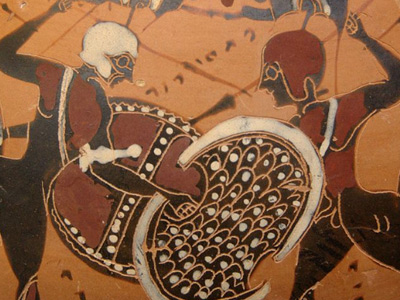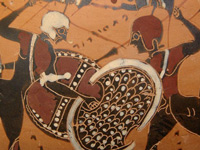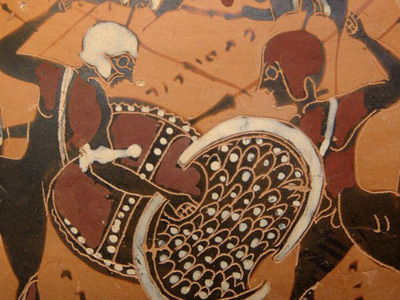First Peloponnesian War (460-445 BC)

Athenian Successes
Tanagra
For several years at the beginning of the war, Sparta remained largely inert. Spartan troops may have been involved in some of the early battles of the war, but if so, they were not specifically mentioned in any sources. In 458 BC or 457 BC, Sparta at last made a move, but not directly at Athens. A war had broken out between Athens' ally Phocis and Doris, across the Corinthian Gulf from the Peloponnese. Doris was traditionally identified as the homeland of the Dorians, and the Spartans, being Dorians, had a long-standing alliance with that state. Accordingly, a Spartan army under the command of the general Nicomedes, acting as deputy for the under-age king Pleistonax, was dispatched across the Corinthian Gulf to assist. This army forced the Phocians to accept terms, but while the army was in Doris an Athenian fleet moved into position to block its return across the Corinthian Gulf.
At this point Nicomedes led his army south into Bœotia. Several factors may have influenced his decision to make this move. First, secret negotiations had been underway with a party at Athens which was willing to betray the city to the Spartans in order to overthrow the democracy. Furthermore, Donald Kagan has suggested that Nicomedes had been in contact with the government of Thebes and planned to unify Boeotia under Theban leadership; which, upon his arrival, he seems to have done.
With a strong Spartan army in Boeotia and the threat of treason in the air, the Athenians marched out with as many troops, both Athenian and allied, as they could muster to challenge the Peloponnesians. The two armies met at the Battle of Tanagra. Before the battle, the exiled Athenian politician Cimon, armoured for battle, approached the Athenian lines to offer his services, but was ordered to depart; before going, he ordered his friends to prove their loyalty through their bravery. This they did, but the Athenians were defeated in the battle, although both sides suffered heavy losses. The Spartans, rather than invading Attica, marched home across the isthmus, and Donald Kagan believes that at this point Cimon was recalled from exile and negotiated a four-month truce between the sides; other scholars believe no such truce was concluded, and place Cimon's return from exile at a later date. Athenian success can also be attributed to them making an alliance with Argos, Sparta's enemy and only threat for control over the Peloponnesian league. The alliance between Athens and Argos was moreover seen as a defensive measure to counteract Sparta's military strength.
Athens conquers
The Athenians rebounded well after their defeat at Tanagra, by sending an army under Myronides to attack Boeotia. The Boeotian army gave battle to the Athenians at Oenophyta. The Athenians scored a crushing victory which led to the Athenians conquering all of Boeotia except for Thebes, as well as Phocis and Locris. The Athenians pulled down Tanagra's fortifications and took the hundred richest citizens of Locris and made them hostages. The Athenians also took this chance to complete the construction of their long walls.
Shortly after this, Aegina surrendered and was forced to pull down its walls, surrender its fleet and became a tribute-paying member of the Delian League, completing what Donald Kagan has called an annus mirabilis for the Athenians.
The Athenians, pleased by their success, sent an expedition under the general Tolmides to ravage the coast of the Peloponnese. The Athenians circumnavigated the Peloponnese and attacked and sacked the Spartan dockyards, whose location was most probably Gythium. The Athenians followed up this success by capturing the city of Chalcis on the Corinthian Gulf and then landing in the territory of Sicyon and defeating the Sicyonians in battle.
The importance of Megara
Modern scholars have emphasised the critical significance of Athenian control of Megara in enabling the early Athenian successes in the war. Megara provided a convenient port on the Corinthian Gulf, to which Athenian rowers could be transported overland, and a significant number of ships were probably kept at Megara's port of Pagae throughout the war. Moreover, while early modern scholars were sceptical of Athens' ability to prevent a Spartan army from moving through the Megarid, recent scholarship has concluded that the pass of Geraneia could have been held by a relatively small force. Thus, with the isthmus of Corinth closed and Athenian fleets in both the Corinthian and Saronic gulfs, Attica was unassailable from the Peloponnese. The Spartans' inability to attack Megara proved to be a key component in their loss to the Athenians, but one scholar believes that the Spartans' inability to attack and control Megara was due to poor calculations and Athenian efforts to avoid an open land battle with the Spartans.
HISTORY

RESOURCES
This article uses material from the Wikipedia article "First Peloponnesian War (460-445 BC)", which is released under the Creative Commons Attribution-Share-Alike License 3.0.
© Stories Preschool. All Rights Reserved.









